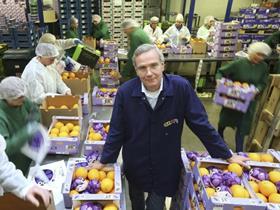
Every summer, Eosta supplies organic Nature & More oranges and lemons from South Africa and Chile to its European customers. As usual in the run-up to the new harvest, I visited South Africa with Eosta’s citrus product manager, Pieter de Keijzer, to see how the crop was developing.
As many in the fresh produce sector are no doubt aware, what we found in the Eastern Cape orchards was far from reassuring, as we witnessed first-hand the mysterious phenomenon that has affected much of the country’s orange sector.
Hardest hit have been farmers – both organic and conventional – in the Eastern Cape. In the entire Sundays River Valley, which accounts for around 60 per cent of South Africa's citrus output, oranges have been falling out of the trees and the peel breaking open as if the fruit were literally too big for its skin.
Production in the region has been affected by what is known as ‘split ends’, where the flesh grows faster than the skin. Approximately 50 per cent of the early orange crop, especially in early navels, looks like it has been lost, which is bad news.
During our visit to Sundays River Valley, it was very sad to see so many oranges lost to split ends that are needed so desperately, especially when growers have been working so long and have invested so much capital in something that is now out of their control.
While researchers are analysing the situation and looking for answers, the general expectation is they will conclude the problem has to do with climate conditions – in this case, a rare combination of rain, sun and other climatic influences.
Orange growers in some northern areas of South Africa also suffered from late hail storms at the beginning of April, although the damage is expected to be much more limited, with only around 10 per cent of the crop said to have been affected.
In spite of the challenges and the fact that we at Eosta will not be receiving as many navel oranges as we had hoped this season, we will be also be importing organic Fukumoto oranges from Chile, although it should be stated that the Chilean volumes will not make up for the shortfall from South Africa. For this reason, we would advise customers not to wait long to buy organic oranges this summer without some form of programme.
The lemon and grapefruit situation has not been affected and since the South African export ban has been lifted we expect a good season for South African lemons, while the first container of Star Ruby grapefruit is expected to arrive in Europe in week 20.
In fact, more organic growers in South Africa are planting lemons, which is good news because we still desperately need more lemons, and prices are fantastic.
It’s clear that not only organic customers buy organic lemons. Lots of people buy them for their untreated skins for use in cooking or baking. The result is that demand for organic lemons is disproportionately high.
This also applies to oranges, so we are also encouraging more growers in South Africa to get involved because there’s a good business case for organic citrus.
With Argentina effectively banned from exporting organic citrus to Europe due to a phytosanitary issue, the EU is dependent on South Africa, meaning there is a tremendous opportunity for orange and lemon growers in South Africa to convert to organic.
In the long term, for all growers converting to organic citrus, we expect good growth and returns.



